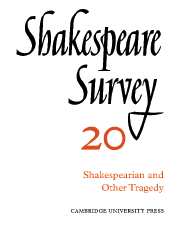Book contents
- Frontmatter
- Shakespeare, Fletcher and Baroque Tragedy
- Seneca and the Elizabethans: A Case-study in ‘Influence’
- George Chapman: Tragedy and the Providential View of History
- Critical Disagreement about Oedipus and Hamlet
- Shakespeare’s Thematic Modes of Speech: ‘Richard II’ to ‘Henry V’
- Anarchy and Order in ‘Richard III’ and ‘King John’
- The Staging of Parody and Parallels in ‘I Henry IV’
- Shakespeare’s Unnecessary Characters
- Walter Whiter’s Notes on Shakespeare
- Shakespeare’s ‘Romeo and Juliet’: Its Spanish Source
- The Grieves Shakespearian Scene Designs
- Shakespeare on the Modern Stage: Past Significance and Present Meaning
- Shakespeare in Brazil
- Recent Shakespeare Performances in Romania
- Shakespeare, the Twentieth Century and ‘Behaviourism’
- The Year's Contributions to Shakespearian Study 1 Critical Studies
- 2 Shakespeare’s Life, Times and Stage
- 3 Textual Studies
- Index
- Plate section
2 - Shakespeare’s Life, Times and Stage
Published online by Cambridge University Press: 28 March 2007
- Frontmatter
- Shakespeare, Fletcher and Baroque Tragedy
- Seneca and the Elizabethans: A Case-study in ‘Influence’
- George Chapman: Tragedy and the Providential View of History
- Critical Disagreement about Oedipus and Hamlet
- Shakespeare’s Thematic Modes of Speech: ‘Richard II’ to ‘Henry V’
- Anarchy and Order in ‘Richard III’ and ‘King John’
- The Staging of Parody and Parallels in ‘I Henry IV’
- Shakespeare’s Unnecessary Characters
- Walter Whiter’s Notes on Shakespeare
- Shakespeare’s ‘Romeo and Juliet’: Its Spanish Source
- The Grieves Shakespearian Scene Designs
- Shakespeare on the Modern Stage: Past Significance and Present Meaning
- Shakespeare in Brazil
- Recent Shakespeare Performances in Romania
- Shakespeare, the Twentieth Century and ‘Behaviourism’
- The Year's Contributions to Shakespearian Study 1 Critical Studies
- 2 Shakespeare’s Life, Times and Stage
- 3 Textual Studies
- Index
- Plate section
Summary
The quatercentenary occasioned a spate of books retelling Shakespeare’s life story, and attempting to create an image of the elusive personality that should be more accurate, or more glamorous, or more exciting, or more ‘contemporary’ than the others that were available. We could run the gamut from Burgess, through Rowse, to Bentley. The spate has now dwindled, and the main recent offering is a reprint of a book first printed in 1928. John S. Smart’s Shakespeare: Truth and Tradition has an excellent ‘Memoir of the Author’ by W. Macneile Dixon in which he remarks that ‘To Smart’s friend and successor in the Queen Margaret College Lectureship, Mr Peter Alexander, we owe the transcription of the pencilled chapters and notes, a labour of love, which made it possible to send this book to the press’. Professor Alexander has been constant in his loyalty. In his own Shakespeare, itself one of the offerings of 1964, he wrote: ‘of modern works, the best brief introduction to a study of Shakespeare’s Life and Times’ is Smart’s book, and pointed out that it had long been out of print. Now for its reissue he has written a Preface setting Smart’s achievement in context. Such a Preface was necessary; for if the book deserves to be regarded as a little classic, it has some of the disadvantages implied by such status. Progress in the study of Shakespeare’s life since it was published has not, it must be confessed, been so remarkable as to render the book seriously out of date on matters of fact.
- Type
- Chapter
- Information
- Shakespeare Survey , pp. 160 - 170Publisher: Cambridge University PressPrint publication year: 1967

